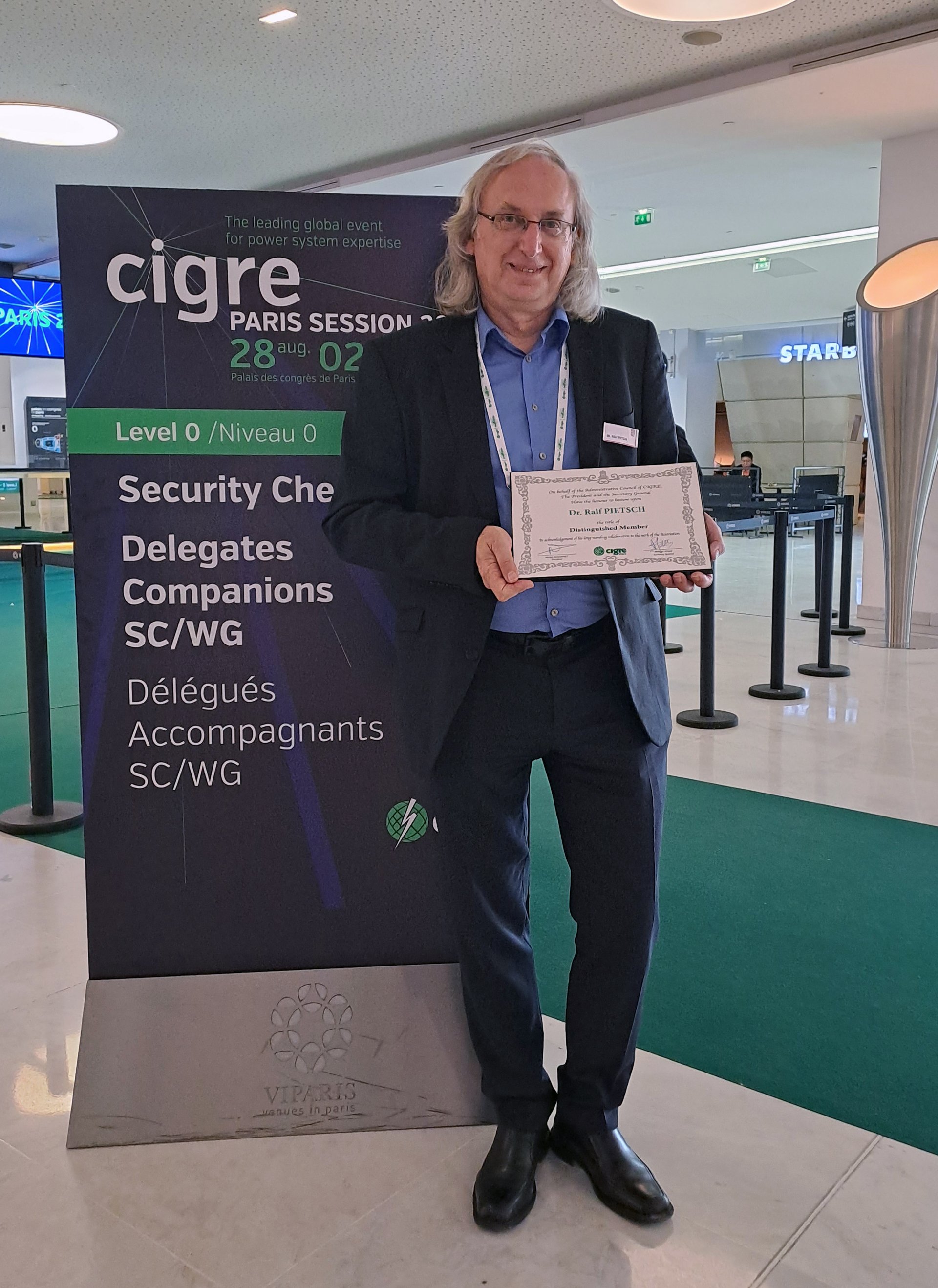-
Impulses
Impulses
- Portfolio
-
Career
Career
-
Company
Company
-
Calibration
Calibration
Dr Ralf Pietsch bows out as Chairman of the CIGRE Study Committee SC D1
What motivation did you bring to the office?
I have been a member of CIGRE for over 25 years, and active in various working groups. It was a great honour for me to be asked whether I could envision chairing the Study Committee SC D1 and added to the list of nominees. I was familiar with CIGRE’s work and knew the subject matter well. After I was appointed by CIGRE and my employer HIGHVOLT had consented to my voluntary work, I was extremely motivated to start my new position. With our work at CIGRE, we want to contribute to the energy industry and the changing framework conditions, especially in light of the upcoming energy transition. Retrospectively, I have to say that the administrative workload played a significant role alongside the technical work. I had not expected that.
Dr Pietsch, when you look back on the past six years, which achievements are you particularly proud of?
Thematically, we addressed or laid the groundwork during these six years in SC D1 for some subjects that are important for current and future supply of electricity. On one hand, testing, monitoring and diagnostic are typical focuses. For example, this includes partial discharge measurement, troubleshooting cable systems and gas-insulated switchgear and gas-in-oil analysis. Some may be aware of the current large-scale 525 kV DC cable projects like ‘Suedlink’ and ‘Suedostlink’ in this context. Another focus of SC D1 is the behaviour of solid, liquid and gaseous insulators and insulation systems under electrical, mechanical and thermal loads. Finally, simulations, simulation tools and physical models, combined with measurements, are another important sub-area within SC D1. ‘Digital twins’ is the keyword here. SC D1 covers a very wide range of topics to address the challenges and issues of energy technology. This is reflected accordingly in the many (over 450) specialists in SC D1, who come from roughly 39 countries, and work on these topics from a technical and physical perspective in 22 working groups. The ‘products’ of SC D1 and the other Study Committees are known as technical brochures, and make the state of the art available to the respective specialists worldwide. Not forgetting our organization and hosting of various conferences (e.g. CIGRE Sessions in Paris), colloquiums (Canada, India and Japan) and symposiums (Slovenia).
The period from early 2020 until mid-2022 was dominated by COVID-19, and a difficult time for CIGRE and its work. As a result, the annual meetings have only been held virtually in the past two and a half years. I have never met some of the members of the working groups in person, only online. I am proud that, with my Secretary Johannes Seiler and the Special Reporters Karsten Juhre, Simon Sutton, Lars Lundgaard and Uwe Riechert, we have been able to keep the Study Committee running and the working groups functioning, and that some of the working groups have even succeeded in finishing their work during this time. In spite of the difficult framework conditions, new working groups were also formed.
I am just as proud of the two virtual CIGRE sessions we held. The 2020 session was a virtual-only event, which was new and entailed a lot of work for all involved. The 2021 session was a hybrid event. All board members and secretaries attended in-person, while the speakers and participants joined by video. This was an immense technical challenge. The pandemic period also sped up the work. Digitalization simplified processes. However, there are still some areas that need work, like the implementation of the new, freely accessible CIGRE website for SC D1.
What tasks and challenges will you be focusing on now?
Of course I will remain active in CIGRE. In the weeks to come, I will be supporting my successor Simon as a mentor. I am also still involved in working groups A2.63 (Transformer Impulse Testing) and D1.63 (Partial Discharge Detection under DC Voltage Stress). As well as that, I would like to dedicate myself more to some new tasks at my employer, HIGHVOLT.
On a personal note, I will be spending more time with my family. They have supported and put up with my work for CIGRE in recent years and have often had to get by without me due to my frequent travels. I am very grateful for their understanding. Now I would like to spend more time with them, especially my little grand-daughter.

We are here for you. Wherever you are.
Looking for the right contact partner?
Do you have a concern, but don't know whom you should contact? You will find that information in our contact overview. For service inquiries, please contact service@highvolt.com directly.

